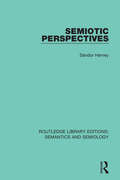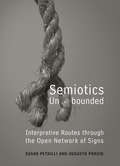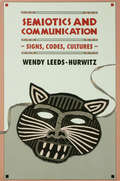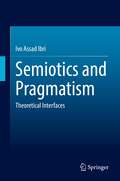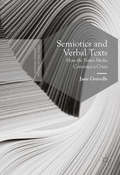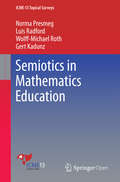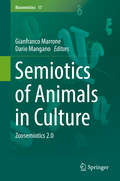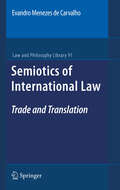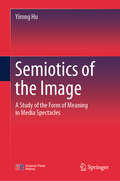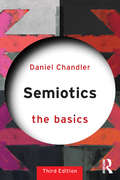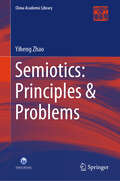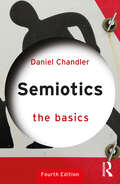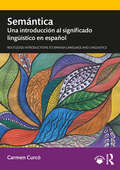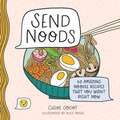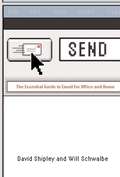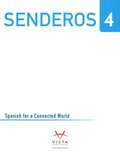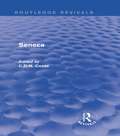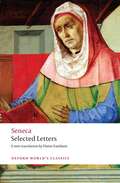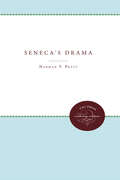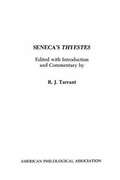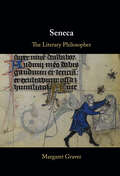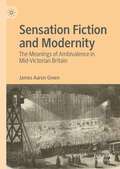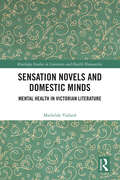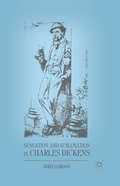- Table View
- List View
Semiotic Perspectives (Routledge Library Editions: Semantics and Semiology)
by Sándor HerveyFirst published in 1982, this book looks at a wide variety of issues concerning the vast field of study that is ‘semiotics. It begins by tracing the beginnings of modern semiotics in the works two pioneering figures — Saussure and Peirce — in order to present fundamental assumptions, notions and distinctions which provide an essential background to the more recent developments. The author then goes on to look at Behavioural Semiotics, Luis Prieto’s idea of "l’Acte Semique", Austin’s theory of ‘Speech Acts’ and Searle’s elaborations, Barthes’ move away from philosophical and scientific approaches in his ideology of Socio-Cultural Signification, Functionalism and Axiomatic Functionalism, style as a form of communication, semiotics of the cinema, and communicative behaviour in non-human species.
Semiotics Unbounded
by Augusto Ponzio Susan PetrilliThe more human knowledge increases, the more signs grow and, with this expansion, the more the boundaries of the science that studies signs also grows. In Semiotics Unbounded, Susan Petrilli and Augusto Ponzio explain the explosion of the sign network in the era of global communication and discuss the important theoretical responses offered by semiotics. Providing a much-needed introductory guide to the subject, Petrilli and Ponzio explore the ever-growing frontiers of semiotics through the thought of prominent sign scholars such as Charles Peirce, Victoria Welby, Mikhail Bakhtin, Charles Morris, and Thomas Sebeok.In an era of global communication, a global approach is necessary, and what may seem to be the whole, is only a part - a view being at once globalizing and open. Each and every sign is never self-sufficient and closed but exists always in a relation of otherness. This is true of the signs forming animals and human beings, individuals and communities, and involves the implication of all living beings in the life of all others. Semiotics Unbounded offers a new and original survey of the science of signs, evaluating it in relation to the problems of our time, not only of a scientific order, but also the problems concerning everyday social life.
Semiotics and Communication: Signs, Codes, Cultures (Routledge Communication Ser.)
by Wendy Leeds-HurwitzCommunication is, among other things, about the study of meaning -- how people convey ideas for themselves and to one another in their daily lives. Designed to close the gap between what we are able to do as social actors and what we are able to describe as social analysts, this book introduces the language of semiotics -- a language that provides
Semiotics and Pragmatism: Theoretical Interfaces
by Ivo Assad IbriThis collection of essays brings together a selection of some of the most important studies of Professor Ivo Assad Ibri about the work of Charles Sanders Peirce. In the last decades, Prof. Ibri made important contributions to Peirce studies by showing that the various individual aspects of Peirce’s work actually form a coherent philosophical system, a metaphysical architecture, as he describes it in his previous book Kósmos Noetós (Springer, 2017). Now this new book brings together a selection of 24 articles and book chapters originally published in both Portuguese and English on different topics and aspects of Peirce’s work, such as philosophy of art, heuristic logic, theories of beliefs and habits, objective idealism, pragmatism and pragmaticism. By bringing together this collection of essays in a single publication, Semiotics and Pragmatism: Theoretical Interfaces will be a valuable source for scholars interested in Prof. Ibri’s unique contributions to the study of the philosophy of Charles Sanders Peirce. “In recognizing Ivo Assad Ibri as one the leading exponents of qualitative interpretations of Peirce in the world today, I refer especially to Ibri’s concentration on Peirce’s later-phase metaphysical writings. Ibri’s expertise will be seen to consist in his precise reformulations of Peirce’s full-fledged philosophy, not just pursuing specialized minor topics.” David A. Dilworth Professor of Philosophy, Stonybrook University “Ivo Ibri’s collected essays brims with clarifying insights from beginning to end. He manages to reveal plenty of aspects of Peirce’s thought from angles the traditional scholarship has not been equipped to notice. How not to miss such kairotic theoretical opportunities and how to exploit them to heuristic advantage is a lesson well taught in this outstanding book.” André De Tienne Professor of Philosophy and Director of the Peirce Edition Project, Indiana University
Semiotics and Verbal Texts
by Jane GravellsThis book offers an innovative approach to analysing written texts, grounded in principles of semiotics. Envisaging whole news media representations as 'signs', and using the real-world example of the BP Deepwater Horizon crisis, the author demonstrates how business crises are constructed through language. Gravells identifies patterns of language which show a progression from one kind of 'current news' representation to a different kind of coverage. This coverage positions the crisis as having symbolic and conventional meaning within varied social contexts, including the arts, business and the environment. Using a wealth of examples from the BP story to illustrate her practical research approach, Gravells draws 'language maps' of different phases of the crisis representation, showing how an early 'iconic' phase of representation moves through an 'indexical' to a 'symbolic' phase, and projects a return to a 'naturalised icon'. This book will be of interest to researchers and students of semiotics, those exploring research methods and linguists with an interest in business and media communications.
Semiotics in Mathematics Education
by Wolff-Michael Roth Norma Presmeg Luis Radford Gert KadunzThis volume discusses semiotics in mathematics education as an activity with a formal sign system, in which each sign represents something else. Theories presented by Saussure, Peirce, Vygotsky and other writers on semiotics are summarized in their relevance to the teaching and learning of mathematics. The significance of signs for mathematics education lies in their ubiquitous use in every branch of mathematics. Such use involves seeing the general in the particular, a process that is not always clear to learners. Therefore, in several traditional frameworks, semiotics has the potential to serve as a powerful conceptual lens in investigating diverse topics in mathematics education research. Topics that are implicated include (but are not limited to): the birth of signs; embodiment, gestures and artifacts; segmentation and communicative fields; cultural mediation; social semiotics; linguistic theories; chains of signification; semiotic bundles; relationships among various sign systems; intersubjectivity; diagrammatic and inferential reasoning; and semiotics as the focus of innovative learning and teaching materials.
Semiotics of Animals in Culture: Zoosemiotics 2. 0 (Biosemiotics Ser. #17)
by Gianfranco Marrone Dario ManganoTo place animals within the realm of nature, means inserting them among the articulations of culture and the social. Semiotics has never avoided this chiasmus, choosing to deal from the outset with the problem of the languages of animals following the old admonition of Montaigne: it is not that animals do not talk, it is us who do not understand them.Recent research in the field of the anthropology of nature and sociology of sciences and techniques allow to think about the Zoosemiotic issue in a different way. Instead of transplanting the language structures – gestures, LIS, etc. – for a semiotic study of the forms of the human and social meaning, it seems more apt to look at their discourse, and as such, the actual interactions, communicative and scientific as well as practical and functional, between humans and non-humans. This book aims to investigate precisely this hypothesis, known here as Zoosemiotics 2.0, working on several fronts and levels:· Anthropology· Languages of the image and visual representations, from art history to cinema· Old and new media. From literature to comics, from cartoons to TV documentaries but also advertising, music, Web and social networks. All those cultural products that talk about the role of human and non-human in society implicitly proposing (and in some way imposing) a form of articulation of such a relationship.· Food and feeding rites· Animalist, vegetarian and vegan movements · Philosophy: metaphysics, ethics, aesthetics
Semiotics of International Law
by Evandro Menezes de CarvalhoLanguage carries more than meanings; language conveys a means of conceiving the world. In this sense, national legal systems expressed through national languages organize the Law based on their own understanding of reality. International Law becomes, in this context, the meeting point where different legal cultures and different views of world intersect. The diversity of languages and legal systems can enrich the possibilities of understanding and developing international law, but it can also represent an instability and unsafety factor to the international scenario. This multilegal-system and multilingual scenario adds to the complexity of international law and poses new challenges. One of them is legal translation, which is a field of knowledge and professional skill that has not been the subject of theoretical thinking on the part of legal scholars. How to negotiate, draft or interpret an international treaty that mirrors what the parties, - who belong to different legal cultures and who, on many occasions, speak different mother tongues - ,want or wanted to say? By analyzing the decision-making process and the legal discourse adopted by the WTO's Appellate Body, this book highlights the active role of language in diplomatic negotiations and in interpreting international law. In addition, it also shows that the debate on the effectiveness and legitimacy of International Law cannot be separated from the linguistic issue.
Semiotics of the Image: A Study of the Form of Meaning in Media Spectacles
by Yirong HuThis book provides a groundbreaking exploration of image semiotics. Going far beyond traditional analyses of static visual texts, it includes dynamic imagery, literary iconography, and psychological images, offering a holistic view of how semiotics permeates various forms of media and cultural expression. The book integrates various case studies on Chinese culture, providing scholars outside China a unique lens through which to understand Chinese cultural thinking through semiotics. This approach not only enriches the academic discussion but also enhances cross-cultural understanding. In addition, the book collects and synthesizes significant achievements in semiotics, incorporating traditional visual theory research from the Panofsky and Warburg schools. This synthesis forms a comprehensive “semiotics of images,” providing an interdisciplinary analytical framework for contemporary “media spectacles.” The book employs multiple methodologies to dissect the visual image spectacles constructed by modern media signs, culminating in a macro-level understanding of cultural spectacles. Furthermore, it situates the comparison between Chinese and Western civilizations within a broad context of cultural philosophy and history, enriching the discourse on cultural differences and similarities.
Semiotics the Basics: The Basics (The Basics)
by Daniel ChandlerThis updated second edition provides a clear and concise introduction to the key concepts of semiotics in accessible and jargon-free language. With a revised introduction and glossary, extended index and suggestions for further reading, this new edition provides an increased number of examples including computer and mobile phone technology, television commercials and the web. Demystifying what is a complex, highly interdisciplinary field, key questions covered include: What is a sign? Which codes do we take for granted? How can semiotics be used in textual analysis? What is a text? A highly useful, must-have resource, Semiotics: The Basics is the ideal introductory text for those studying this growing area.
Semiotics: Principles & Problems (China Academic Library)
by Yiheng ZhaoThis book attempts to build semiotics on a new foundation, which is “meaning-making”. At the very beginning, the central terms of signs and semiotics are redefined, as the old definition for sign (one thing standing for another) is far from satisfactory. Sign is a perception that is regarded as carrying meaning. In this way, semiotics, now built on the foundation of meaning-making and meaning-cognition, is a science of meaning. All the principles are now under the scrutiny of the new definition, and many issues are answered more succinctly. Therefore, the new definition is extended to the new fields of cultural activities in human society, and a series of problems arise. This book intends to discuss and explore these questions, such as the “middle reclining” in the cultural markedness, the sliding of motivation in art, the difficult distinction between falsehood and untruthfulness, and the driving force of modernization in China.
Semiotics: The Basics (The Basics)
by Daniel ChandlerThis fourth edition of the bestselling textbook, now available in print, eBook, and audiobook, has been fully updated, continuing to provide a concise introduction to the key concepts of semiotics in accessible and jargon-free language. Demystifying what is a complex, highly interdisciplinary field, key questions covered include: what are signs and codes? What can semiotics teach us about representation and reality? What tools does it offer for analysing texts and cultural practices? The fourth edition of Semiotics: The Basics focuses in particular on its application to communication and cultural studies. It has been extensively revised and extended, with an entirely new section on cognitive semiotics, many more illustrations, and a new glossary. With updates to theory, further examples, and suggestions for review and further reading, this must-have resource is both the ideal introductory text and an essential reference guide for students at all levels of language and communication, media, and cultural studies.
Semántica: Una introducción al significado lingüístico en español
by Carmen CurcóSemántica: Una introducción al significado lingüístico en español es una introducción integral al estudio de la semántica con un enfoque especial en la lengua española. Sin asumir conocimientos lingüísticos previos, el libro conduce al lector por los principales temas del estudio del significado, logrando un equilibrio entre la teoría y la práctica. Los temas nocionales y las discusiones conceptuales se entrelazan con el desarrollo de herramientas analíticas. Las explicaciones se apoyan en abundantes ejemplos que ilustran los puntos tratados. Cada capítulo proporciona ejercicios y sugerencias para lecturas e investigaciones adicionales con el fin de guiar a los estudiantes de español en las complejidades de la semántica léxica y composicional. Escrito íntegramente en español en un estilo claro y atractivo, el libro es ideal para estudiantes avanzados de pregrado y posgrado de español y lingüística hispánica. Semántica: Una introducción al significado lingüístico en español is a comprehensive introduction to the study of semantics with a special focus on Spanish. Without assuming prior linguistic knowledge, the book leads the reader through the main topics in the study of meaning, striking a balance between theory and practice. In a clear and engaging style, notional issues and conceptual discussions are intertwined with the development of analytical tools. Explanations are supported by plentiful examples to reinforce each new point. Exercises and suggestions for further reading and research are provided throughout to guide students of Spanish seamlessly into the complexities of lexical and compositional semantics. Written entirely in Spanish, the book is ideal for advanced undergraduate and graduate students of Spanish and Spanish linguistics.
Send Noods: 50 Amazing Noodle Recipes That You Want Right Now
by Chloe GodotGet the noods you really want!Things are looking hot with Send Noods, a cleverly tantalizing book of 50 noodle recipes that will never fail to whet your appetite.When your actual DMs are just too cringeworthy and you’d rather have a bowl of ramen to keep you warm at night, turn to the cookbook that really satisfies. Each chapter is organized to help you find your perfect match, from Chapter One: The Little Black Book of Basics, which steers you toward every good ol’ base sauce and broth you’ll ever need, to Chapter Two: Heart Warmers, that always deliver on their comfort-food promises, to Chapter Five: The Hotties, that leave you hungry for more. Go ahead and ogle the piping-hot illustrations of your deepest cravings, including:- F*&#boy Fettuccini- Red Flag Red Sauce- Looking Fresh Pesto- How You Doin’ Homemade Italian Sausage- U Up? Udon- Sex Is Cool, But Have You Tried My Pho?- Swipe Right Ramen- Slide into My DMs Strozzapreti- Mack on This Mac ‘n’ Cheese- Dreamboat ArrabiataComplete with playful illustrations and explicit instructions that make each recipe’s intentions known, Chloe Godot and Alice Potter's Send Noods is the book of hot dishes that will satisfy epicureans in ways unsolicited DMs just never could.
Send: The Essential Guide to Email for Office and Home
by David Shipley Will SchwalbeThe hows and whys of using email, and how to communicate effectively.
Senderos Level 4 Spanish for a Connected World
by Vista Higher LearningSenderos Level 4 Spanish for a Connected World
Seneca (Routledge Revivals)
by Costa C.D.N.This volume, first published in 1974, offers a selection of modern perspectives on Seneca, covering his prose treatises, his letters and his tragedies. For centuries literary and philosophical circles had to take Seneca seriously, even if they could not always respect him, and although his reputation has fluctuated, there has been a revival of interest in his achievements. Accordingly, a large part of Seneca is devoted to this later influence at the deliberate expense of not covering all of Seneca’s less familiar works. The Moral Essays, the tragedies and the letters to Lucilius are examined by the contributors, who also discuss Seneca’s philosophical influence and the Senecan heritage in English and neo-Latin literature. Each essay contains insightful and sometimes controversial material, which is of value to the specialist as well as to students of Latin, English or French literature.
Seneca Selected Letters (Oxford World's Classics)
by Elaine Fantham Seneca Corporation StaffWe often speak of Seneca as the most distinguished of the many Spanish writers and poets of Rome's imperial age, starting from his own father of the same name, and his nephew Lucan, and including Columella, Martial, and Quintilian. But although all of these writers came from Spain, they were Roman (or Italian) in descent, culture, and tradition. Scipio Africanus had taken eastern and southern Spain from the Carthaginians during the Hannibalic war, and most of the Spanish peninsula had been Roman since the second century BCE.
Seneca's Drama
by Norman T. PrattWith insight and clarity, Norman Pratt makes available to the general reader an understanding of the major elements that shaped Seneca's plays. These he defines as Neo-Stoicism, declamatory rhetoric, and the chaotic, violent conditions of Senecan society.Seneca's drama shows the nature of this society and uses freely the declamatory rhetorical techniques familiar to any well-educated Roman. But the most important element, Pratt argues, is Neo-Stoicism, including technical aspects of this philosophy that previously have escaped notice. With these ingredients Seneca transformed the themes and characters inherited from Greek drama, casting them in a form that so radically departs from the earlier drama that Seneca's plays require a different mode of criticism."The greatest need in the criticism of this drama is to understand its legitimacy as drama of a new kind in the anicent tradition," Pratt writes. "It cannot be explained as an inferior imitation of Greek tragedy because, though inferior, it is not imitative in the strict sense of the word and has its own nature and motivation."Pratt shows the functional interrelationship among philosophy, rhetoric, and "society" in Seneca's nine plays and assesses the plays' dramatic qualities. He finds that however melodramatic the plays may seem to the modern reader, Seneca's own career as Nero's mentor, statesman, and spokesman was scarcely less tumultuous than the lives of his characters. When the Neo-Stoicism and rhetoric of the plays are charged with Seneca's own tortured, passionate life, Pratt concludes, "The result is inevitably melodrama, melodrama of such energy and force that it changed the course of Western drama."Originally published in 1983.A UNC Press Enduring Edition -- UNC Press Enduring Editions use the latest in digital technology to make available again books from our distinguished backlist that were previously out of print. These editions are published unaltered from the original, and are presented in affordable paperback formats, bringing readers both historical and cultural value.
Seneca's Thyestes
by Lucius Annaeus Seneca R. J. TarrantThyestes is widely acknowledged to be one of Seneca's most powerful tragedies. The book provides a modern commentary on the play.
Senhora
by José De AlencarA critique of marriage of convenience, this classic of Brazilian literature clarifies universal truths as one-time lovers reconcile as husband and wife. The poor orphan Aurélia is devastated when her true love, Fernando, breaks their engagement for the financial rewards of a marriage of convenience to another. But Aurélia unexpectedly inherits a fortune and plans her revenge. Winning marriage to Fernando with a large dowery, she stuns her lover on their wedding night by imposing a marriage of convenience until the dowery is returned. The marriage descends into one of hate more than convenience, until both recognize the errors of their ways.
Sensation Fiction and Modernity: The Meanings of Ambivalence in Mid-Victorian Britain
by James Aaron GreenThis book re-reads the relationship between the Victorian sensation novel and modernity. Whereas critics have long recognized its appearance in the form of nervous subjects and technologically-enabled mobility, Green contends that sensation fiction also depicts modernity in the form of intellectual and moral discontinuity. Through closely historicist readings of novels by Wilkie Collins and Mary Elizabeth Braddon, as well as by Joseph Sheridan Le Fanu and Rhoda Broughton, this book traces how discontinuity is manifested in the suspenseful plotting of these fictions, through which readers are challenged to revise conventional assumptions about the world and adopt more contingent perspectives. The study demonstrates that reading for this sense of modernity does not merely uncover the genre's engagements with various mid-century contexts. More fundamentally, it broaches a new sense of the function and significance of sensation fiction: the acclimatization of its readers to the discontinuities of modern existence.
Sensation Novels and Domestic Minds: Mental Health in Victorian Literature (Routledge Studies in Literature and Health Humanities)
by Mathilde VialardDrawing on the recent academic interest in approaching health and wellbeing from a humanities perspective, Sensation Novels and Domestic Minds investigates how the Victorians dealt with questions of mental health by examining literary works in the genre of sensation fiction. The novels of Mary Elizabeth Braddon and Wilkie Collins, two prominent writers of the genre, often portray characters suffering from mental illnesses commonly diagnosed at the time, among which are monomania, moral insanity, melancholia and hypochondria. By studying the fictional works of Braddon and Collins alongside medical texts from the nineteenth century, it sets out to investigate how these novels fictionally represented real mental sufferings. This book considers the different mental illnesses the characters of sensation novels develop inside and outside the home as they struggle to define their own identity against Victorian social expectations. It demonstrates how these novels fictionalised the crisis of the leisured upper classes, who spent most of their time at home, and found themselves at odds with a society that increasingly separated the domestic and working environments, while also considering the impact that a lack of a sense of domestic belonging could have on their mental health. Sensation Novels and Domestic Minds further analyses the extent to which domesticity—in its excess or lack—could afflict the mental health of Victorian men and women through the fictional representation of suicidal thoughts and acts in the novels of Braddon and Collins.
Sensation and Sublimation in Charles Dickens
by John GordonThis book explores three crucial stages in Dickens' on-going voyage of discovery into what has been called the 'hidden springs' of his fiction; arguing that in three of Dickens best known novels, we witness Dickens responding to some identifiable force represented as coming from underneath the ground plan of the book in question.
